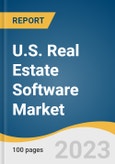The emergence of advanced construction technologies and rising internet penetration are propelling the adoption of digital technologies in the construction sector. Construction companies focus on digitizing their operations to reduce workforce costs and manual errors in the system, thereby creating robust opportunities in the market. The increasing adoption of digital economic frameworks by the U.S. government is also expected to create a positive outlook for the market. In November 2021, the U.S. government introduced the Infrastructure Investment and Jobs Act (IIJA) to provide funding for developing a digital construction management system. The program aided by a grant of USD 20 million per year for the next five years, is expected to boost the adoption of construction software in the sector.
Key players operating in the market are focusing on partnerships and new product launches to stay competitive. For instance, in March 2023, Attom Data launched Property Navigator, a real estate data solution designed to assist clients in searching for desired commercial or residential properties across the U.S. The company also offers a seven-day free trial of the solution, post which it is available. Further, in June 2022, Commercial Real Estate Exchange, Inc. (Crexi.com) collaborated with the research and technology group First Street Foundation and unveiled its new platform, Climate Factors, to assist users in identifying the impact of climate change on properties and making more informed decisions, supporting the growth of the U.S. real estate software.
U.S. Real Estate Software Market Report Highlights
- The contract software segment is expected to register a CAGR of 11.4% from 2023 to 2030. Contract software is witnessing growing demand in diverse industries owing to its various benefits, such as simplified storage, management, and creation of lease contracts. The real estate business is becoming more customer-centric in the U.S., which is expected to accelerate the adoption of contract software in the market
- The cloud segment is anticipated to grow at a CAGR of 11.8% from 2023 to 2030. The cloud-based real estate software demand is rapidly increasing as it requires minimum infrastructure setup and can be accessed from any location. Further, these solutions help enhance customer engagement and retention, boost employee productivity, and offer various other business benefits, supporting the industry's growth
- The real estate agents segment is expected to register a CAGR of 10.9% from 2023 to 2030. The shifting focus of real estate agents on improving their service delivery to attract potential business clients and improve their customer base is accelerating the segment's growth
- The commercial segment is anticipated to grow at a CAGR of 11.1% from 2023 to 2030. Significant digitalization and rising public & private investment are creating robust opportunities for the market in the commercial sector
Table of Contents
Companies Mentioned
- Altus Group Ltd.
- Attom Data
- Badger Maps
- Black Knight Technologies, LLC
- BoomTownROI
- CoreLogic
- Costar Realty Information Inc.
- Commercial Real Estate Exchange, Inc. (Crexi.com)
- LionDesk LLC
- Microsoft Corporation
- MRI Software Inc.
- Propertybase
- RealPage, Inc.
- Realvolve
- Reonomy
- SalesRabbit Inc.
- SAP SE
- Spotio
- Wise Agent
- Yardi Systems Inc.








